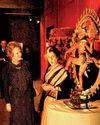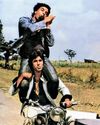
For a people who bring a shine to others’ lives, their own are filled with darkness. The diamond polishers of Gujarat, numbering an estimated 800,000, are finding themselves out of a livelihood that has been handed down to them over generations and which is the only vocation that they have ever known. According to industry insiders, some 15,000 people have lost their jobs in recent months. Unable to cope with the uncertainty, many of them are taking their own lives. Among them was 55-year-old Vinu Moradiya from Surat, who had lost his job this year, making it difficult for him to support his family of six. Driven by despair, he, his wife and their two younger children entered a pact and died by suicide in early June, leaving behind 25-year-old Rushita and her 22-year-old brother Parth. Heartbroken, Rushita, too, tried to take her own life three days later, but, thankfully, survived.
India may have exhausted its diamond mines long ago, but it has emerged as a world leader in the supply of cut and polished diamonds, thanks mostly to the business prowess of the diamantaires of Gujarat. Having imported roughs worth over Rs 1.4 lakh crore in FY23, the country’s exports of finished diamonds touched nearly Rs 2 lakh crore during the fiscal, or about 20 per cent of the world’s total. However, hit first by the Covid-19 pandemic and then the Ukraine-Russia war that curtailed the supply of rough diamonds to India, besides the cheaper lab-grown diamonds from China that have flooded the global markets, the business has been seeing a steady downturn. In the first quarter of this financial year (FY24), exports stood at about Rs 37,000 crore, a steep 24 per cent year-over-year (YoY) decline from Rs 48,350 crore in Q1FY23. The changed market dynamics have had the worst impact on those at the bottom of the pyramid—the diamond polishers and other small traders.
This story is from the October 30, 2023 edition of India Today.
Start your 7-day Magzter GOLD free trial to access thousands of curated premium stories, and 9,000+ magazines and newspapers.
Already a subscriber ? Sign In
This story is from the October 30, 2023 edition of India Today.
Start your 7-day Magzter GOLD free trial to access thousands of curated premium stories, and 9,000+ magazines and newspapers.
Already a subscriber? Sign In

He gave the beat to the world
He would pick up the rhythms of each experience of mobility and weave them into his taals. Thus it was that he reflected joy and laughter in rhythmic cycles...such was the magic of Zakir's fingersText and photographs by Raghu Rai

KERALA TOURISM CAMPAIGN, 1989 - TICKETS TO PARADISE
All it took was a catchy tagline-'God's Own Country'-for the world to discover Kerala's wealth of natural beauty. It remains among the best tourism ad campaigns, earning the state a place among top 10 international destinations

SPIRITUALITY - THE GURUS OF COOL
Among the cult Indian gurus, no one had a bigger hold on western minds than 'Osho' Rajneesh. He's also perhaps the role model for the enterprise-building gurus of today

RETAIL SHOPPING - THE MALL MANIA
Shopping malls, a 1990s innovation in India, changed the way the Indian middle class shops. Their success now lies in being 'shoppertainment' destinations, offering something for everyone

CULINARY RENAISSANCE, 1978 - TANDOORI NIGHTS
ITC's Bukhara and Dum Pukht turned the world to tandoori cuisine and had an enormous impact on the F&B industry. Decades on, they are still a pit-stop for celebrities and heads of state visiting Delhi

INDIAN WRITING IN ENGLISH - REVENGE OF THE NATIVE
Rushdie lit the way but Indian writing in English has taken a life of its own in the past few decades, with translated Indian fiction most recently having its moment in the sun

INDIAN ART - A BRUSH WITH GOLD DUST
The 1990s economic liberalisation came as oxygen, lighting up the Indian art scene. Today, artworks by established masters routinely go for astronomical amounts

FESTIVAL OF INDIA, 1982 - CULTURE CAPITAL
The Festival of India grew into a symbol of our 'soft power', introducing our art and aesthetics to a global audience while also helping rebrand our domestic products

THE INDIPOP TREND - DISCO GOES DESI
For ages, the film song ruled. Nothing else was audible. Then came Nazia, charioteered by Biddu, and Indian ears went into a pleasant madness. Literally, Disco Deewane. A whole genre was born

SHOLAY 1975 - THE BIRTH OF THE FANDEMIC
India had seen hits before. But Sholay seared into its collective psyche like a badland bullet. The effect was on a scale never seen before- one film creating a new mass folk culture. And a trail of monster blockbusters that still continues